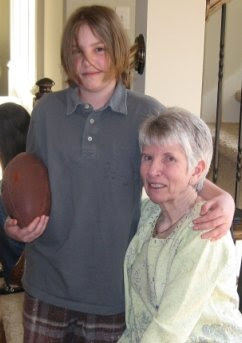"Today for Show and Tell, I've brought a tiny marvel of nature: a single snowflake. I think we might all learn a lesson from how this utterly unique and exquisite crystal turns into an ordinary, boring molecule of water, just like every other one, when you bring it in the classroom. And now, while the analogy sinks in, I'll be leaving you drips and going outside."
--Calvin, from Calvin & Hobbes
I nabbed this most insightful quote from a kick-*ss blog written by a kick-*ss unschooler. (Thanks Heart-Rockin' Mama!)Yesterday was Learn Nothing Day, a holiday created by Sandra and Holly Dodd to poke a little fun at those folks who ask us questions like, "But if you don't go to school, how do you learn?"We've gotten that comment, mostly from kids. The adults are a bit more discerning in their questioning, asking if we worry about college or how we learn about physics or what our days look like because they could never "stand to be home with their kids" every day. It's ok, it's normal to misunderstand something that's out of your realm of experience, but to unschoolers, who operate on the belief that learning happens all the time - ALL*THE*TIME - it does, truthfully, get a little tiresome after a while.
I'd forgotten to warn my kids ahead of time that Learn Nothing Day was approaching. It's only the 2nd annual and I didn't pay much attention to it last year. This year, however, I told Jonathan about it over breakfast. His reply? "I wish I'd known this sooner, so I could've planned better."
He has a whole pile of new birthday gifts so there's no WAY he won't learn anything today. But then we laughed about how we were learning something while we discussed not learning anything. And then we learned how hard it is to try to learn nothing. Doh!
His school friend summed up our point nicely by chiming in, "I try not to really learn anything during summer break" with a shrug. What he means, of course, is that he doesn't do anything schooly - no reading of textbooks, no writing of reports after reading a good book, no creating a diorama to explain that cool documentary you just watched. And therein lies one of my biggest beefs with the way school operates. Schools would have us believe that learning happens only when you are being taught by someone else. They'd also have us believe that it's "work" and "a kid's job" and "very serious" and other such sobering things. And in school - it is, usually. Even the younger grades get less and less fun as the push for higher test scores and earlier reading takes over.
But kids are learning all the time - ALL*THE*TIME - in AND out of school. They're learning even when they're seemingly "doing nothing" because, honestly, it's impossible to do nothing.
What unschoolers have captured is the beautiful realization that learning isn't separate from living. That in the process of living, learning happens. ALL*THE*TIME. When you're preparing for a birthday party, you're learning. When you're reading, watching tv, playing a video game you're learning. You're even learning as you rest or watch clouds drift by or sun yourself on the beach. It's impossible to not learn.
Humans are hard-wired to learn from their surroundings, but it helps if one is interested, motivated, and inspired. And this is where school does a really sh*t job. And before you give me over to the teachers' unions for a lashing in the public square, listen - I WAS a public school teacher and I KNOW how teachers' hands are tied (to a certain extent). What would be really beautiful is if a whole bunch of school personnel rose up and said, "we're tired of this drudgery!" and started interacting - really interacting, on a level that isn't "I say - you do" - with the kids. Then watch the students' eyes light up and let the revolution begin.
I know, I know. DUDE - WHAT AM I SMOKING?
But seriously, people - we've got to stop operating under the assumption that kids won't learn if they aren't forced, coerced, prodded, and locked into a damn brick building for 7 hours of every day, 180 days a year. It's ludicrous. And we also have to stop believing that the only important things one learns are what's taught within school walls.
When talking with Jonathan's school friend today, we used the example of his juggling. He's an expert juggler for his age and he spends a lot of time researching technique, watching pros on youtube, finding the right equipment, practicing, and even choreographing new and unique rhythms. "Just think how much you learn about juggling all the time!" I pointed out, and we talked about how learning isn't something one only does at school. He does learn at school, and he's an excellent student, but that's one way to learn among many. He seemed happy at that notion, that he learns at school but he learns in other ways at other times and in other places as well, and it's not always stressful or boring or difficult.
And as for the whole "what about college" thing (or what about physics or writing term papers or learning to meet assignment deadlines or "insert stereotypical worry here"), unschooling doesn't mean you just give everything over to the universe and say "what will be, will be!" and then dance off into the sunset with your dreadlocks swaying and leaving a trail of incense behind. You do what anyone would do who wants to get into college (or take a physics class or write a paper or meet a deadline) - you prepare. Unschoolers don't learn little bits of this and that in separated-out morsels in preparation of possibly "someday" needing that information. They follow their interests and tackle their goals and learn what they need to learn as they go. And it works.
And it works on a radically different timeline from school, too. Just because state mandates say that fourth graders learn to long-divide, it doesn't mean there's some innate need to learn to long-divide at age 9. No one needs to long-divide until they need to long-divide. Not sooner, not later. And when one needs to know something, one typically goes about learning it.
Adults have a difficult time wrapping their heads around this. But usually those fears also stem from the worry that their child will be too different from other kids, or they'll appear to be neglectful parents. It's easier to follow the herd. I totally get that. That's why you'll see unschoolers hugging and jumping up and down in glee when they get together - SOMEONE LIKE ME! It ain't easy to paddle against the current, lemme tell ya.
But what it comes down to is this: What do I care about more, my child's freedom and well-being and happiness? or the nosy lady's misinformed opinion at the local mini-mart?
No contest.
Paddling upstream gets easier. I tried to learn nothing yesterday. I gave it a really good go. I was so tired from hosting 4 parties in 6 days that I sat on my butt almost all day, sorting through digital photos (oops, I learned how to use flickr), blogging (oops, I used an online thesaurus to choose some words), reading magazines (oops, I flagged several recipes and art activity ideas), and eating (oops, I learned that grazing on leftover party food all day makes me a bit queasy *BURP*).
I challenge you to learn nothing for one day. And then, the next time you wonder about us wacky weirdo unschoolers, perhaps you'll pause and think.... "You just might have something there...."
Source: I nabbed this article and quote from another awesome, unschooling, blogging mama, Piscesgrrl. Thought it timely with the approach of the traditional school year.
Draw a Sitting Dragon
11 years ago






















